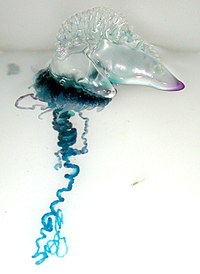
Photo from wikipedia
BACKGROUND The role of nutrition in donor after brain deaths (DBDs) has yet to be adequately discussed. The primary aim of this study was to investigate whether the nutritional intake… Click to show full abstract
BACKGROUND The role of nutrition in donor after brain deaths (DBDs) has yet to be adequately discussed. The primary aim of this study was to investigate whether the nutritional intake in the 48 h before organ retrieval may play a role on the graft functional recovery assessed with Model for Early Allograft Function (MEAF) Score. METHODS Single-center retrospective study evaluating all liver transplants performed at the University Hospital of Udine from January 2010 to August 2020. Patients receiving grafts from DBD donors fed with artificial enteral nutrition in the 48 h prior to organ procurement (EN-group) or who did not (No-EN-group). Caloric debt was calculated using the difference between the calculated caloric needs and the effective calories delivered through enteral nutrition. RESULTS Livers from EN-group presented a lower mean MEAF score compared to the no-EN-group: 3.39 ± 1.46 versus 4.15 ± 1.51, respectively (p = .04). A positive correlation between caloric debt and the MEAF score was found within the overall population (r = .227, p = .043) as well as in EN-group (r = .306, p = .049). CONCLUSIONS Donor's nutritional intake in the final 48 h before organ procurement correlates with MEAF score, and nutrition probably plays a positive role on the functional recovery of the graft. Large future randomized controlled trials are needed to confirm this preliminary results.
Journal Title: Clinical transplantation
Year Published: 2023
Link to full text (if available)
Share on Social Media: Sign Up to like & get
recommendations!